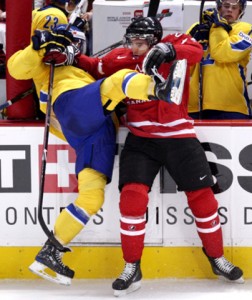Cormier’s suspension should start a discussion about changing hockey’s culture
The Quebec Major Junior Hockey League has suspended forward Patrice Cormierof the Rouyn-Noranda Huskies for the rest of the regular season and the playoffs.
Of course they did. Really, it’s the only option the league’s disciplinarian had after the former captain of Canada’s World Junior tournament team laid Mikael Tamof the Quebec Remparts out with a vicious elbow.
But there are still lots of questions, the biggest and broadest of which is: where do we go from here? Not just Tam and Cormier, but the game itself.
By all accounts, Tam has already begun to recover. He hasn’t shown any signs of a concussion and he’s been released from the hospital. All good news, to be sure. But no one is sure if he’ll be able to re-join his teammates, or when. Sad when you consider that the 18-year-old defenceman was having a career season with 10 goals and 12 assists.
Cormier, of course, will be spending most of his time training on his own. Lou Lamoriello, the GM of the New Jersey Devils who drafted Cormier 54th overall in the 2008 draft, has already stated that the team will not place him in the American Hockey League or on any other teams affiliated with the Devils.
"We will honour the league's suspension, have not considered, and will not explore other avenues for his return this season," Lamoriello said in a press release.
This won’t be the end of Cormier’s career though. He's still a top-flight prospect who might be able to bounce back from this incident. Certainly, if he keeps his head down, his nose clean and continues to develop as a player, the Devils will have to consider calling him up to the NHL in the next few seasons.
Cormier has issued his own public statement, saying, in part, “I deeply regret the circumstances surrounding this event and wish Mikael Tam a speedy and full recovery."
No apology to Tam, just some best wishes. As so often happens in incidents like this, the injured party has to deal with the consequences of the play, while the offender is able to, eventually, resume their career. I wouldn’t want Cormier on my team, but the world of hockey has found roomin its heart to forgive a lot of players after similarly vicious incidents. Todd Bertuzzi is the first name that comes to mind.
And that brings us to the real problem: violence in hockey.
After all, everyone abhors Cormier’s cheap shot, but no one knows how to remove dirty hits from the game. I know that I enjoy watching a good hockey fight, as I think most people do, and there’s nothing like a good, solid hit. Hockey is an intrinsically violent game.
But there is a semi-permanent, translucent line in hockey that a player can cross where finishing their check somehow becomes a late hit. Standards seem to change case by case. This line needs to be better defined, with clearer consequences outlined. How else can hockey separate good violence from, for lack of a better term, bad violence?
I’m not sure. Hockey and hockey culture will always be physical, and tough players will always be admired. It would require an incredible sea-change to adjust the attitudes of players, coaches, officials and fans.
Suspending Cormier is certainly a good step. He’s a very visible junior hockey player, and as I mentioned in an article last week, he’s a repeat offender. It sends a strong message to the hockey community, and was the natural conclusion to a nasty chapter in QMJHL history.
Forcing Cormier, and other offenders at all levels of hockey, to engage in public awareness campaigns might be productive as well.
However, the most effective solution would be to force the offending player’s team to forfeit the game.
Had Quebec lost that game (the Remparts rallied to win 3-2 in the shootout), I feel that the QMJHL should have ruled the game as a forfeit for Rouyn-Noranda. If this became standard practice in junior and professional hockey leagues, I think it would create a sense of peer pressure that a cheap or dirty hit hurts the team in the standings, and players and coaches would do a better job of policing themselves. After all, no one wants to be directly responsible for costing their team a game, in addition to be suspended and fined.
It will take a huge, systemic change to eliminate dirty hits from hockey, but I think it’s time that better minds than mine began to apply themselves to this problem.
